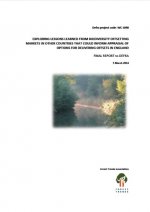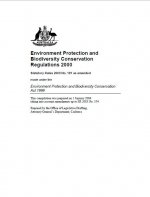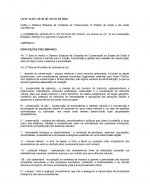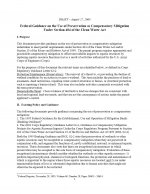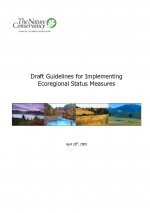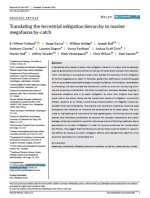生物多様性オフセットに関する BBOPスタンダード
The BBOP Standard on Biodiversity Offsets translated into Japanese.
Exploring lessons learned from biodiversity offsetting markets in other countries that could inform appraisal of options for delivering offsets in England
Final report to Defra (project code WC1098)
Guy Duke, Kerry ten Kate - Forest TrendsThe objective of this study was to gather evidence, from established offsetting markets in the US and Australia, through structured interviews and a limited review of literature, on (1) the range and extent of costs and benefits to developers arising from offsetting regimes, (2) the effects of market design on offset prices, (3) conservation outcomes […]
Biodiversity Offsets: Mileage, Methods and (Maybe) Markets
Kerry ten KateBusiness case for voluntary, beyond compliance measures: license to operate, reputation, competitive advantage, reduce liabilities Is this sufficient to encourage voluntary offset commitments?
Environment Protection and Biodiversity Conservation Regulations 2000: Statutory Rules 2000 No. 181 as Amended
Government of AustraliaFor paragraph (g) of the definition of nuclear action in subsection 22 (1) of the Act, a nuclear action includes establishing, significantly modifying, decommissioning or rehabilitating a facility where radioactive materials at or above the activity level mentioned in regulation 2.02 are, were, or are proposed to be used or stored.
Lei No 14.247, 29 Julho 2002
Government of BrazilEsta lei institui o Sistema Estadual de Unidades de Conservação no Estado de Goiás e estabelece critérios e normas para a criação, implantação e gestão das unidades de conservação, além de dispor sobre incentivos e penalidades.
Federal Guidance on the Use of Preservation as Compensatory Mitigation Under Section 404 of the Clean Water Act
Government of the United StatesThis document provides guidance on the use of preservation as compensatory mitigation undertaken to meet permit requirements under Section 404 of the Clean Water Act and/or Section 10 of the Rivers and Harbors Act of 1899. The permit program requires appropriate and practicable compensatory mitigation to offset unavoidable impacts to aquatic resources by replacing aquatic […]
Draft Guidelines for Implementing Ecoregional Status Measures
The Nature ConservancyEcoregional status measures comprise a set of data about the viability, threat and conservation status of biodiversity within an ecoregion. Derived primarily from data generated by ecoregional assessments, these measures provide a snapshot of the status of biodiversity conservation, as well as a measure of trends in this status over time.
Newmont Mining Biodiversity Offset Case Study – 2009
Case study of Newmont Mining BBOP pilot biodiversity offset at the Akyem gold mine, Ghana. Published in 2009.
Biodiversity offsets: relative offsetability of impacts.
Unpublished report to the New Zealand Department of Conservation. The Biodiversity Consultancy Ltd.: Cambridge, UK.
The Biodiversity ConsultancyThis report has been prepared for the Biodiversity Offset Program (BOP) of the New Zealand Department of Conservation to help advance offset thinking in New Zealand and as a contribution to the Business and Biodiversity Offset Programme1, of which BOP is a member. Given the pioneering nature of the subject, it is not intended as […]
Translating the terrestrial mitigation hierarchy to marine megafauna by-catch
In terrestrial and coastal systems, the mitigation hierarchy is widely and increasingly used to guide actions to ensure that no net loss of biodiversity ensues from development. We develop a conceptual model which applies this approach to the mitigation of marine megafauna by-catch in fisheries, going from defining an overarching goal with an associated quantitative […]



